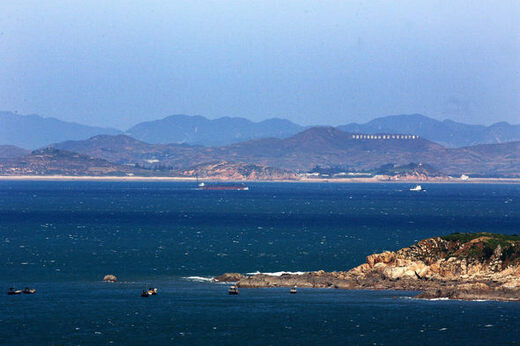hankyoreh
Links to other country sites 다른 나라 사이트 링크
Former policy makers say all-out war with North Korea is unlikely

Former high-ranking civil servants in the area of unification think that it is unlikely that an all-out war will occur between North and South Korea in the next 10 years, but that there is a high probability of a local conflict breaking out in the West (Yellow) Sea.
On May 11, the Institute for Peace and Unification Studies at Seoul National University announced the results of a questionnaire it conducted between Oct. 2014 and Jan. 2015 of 110 minister- and vice minister-level officials in the Blue House, the Ministry of Unification, the Ministry of Foreign Affairs, and the Ministry of National Defense and senior officials in the National Intelligence Service who served between the administrations of Roh Tae-woo (1988-1993) and Park Geun-hye (2013-present).
82.4% of respondents to the survey believe that it is likely that a local conflict will occur on the Korean Peninsula in the next 10 years. In terms of where such a local conflict might occur, 91.7% of all respondents suggested the waters around the Northern Limit Line (NLL) in the West (Yellow) Sea, including the five islands in those waters. On the other hand, the prevailing view (representing 84.3% of respondents) was that it is unlikely that an all-out war will occur.
74.3% of these former officials thought that the Kaesong Industrial Complex should be kept open even if it requires some degree of sacrifice, and 45% thought that tourism to Mt. Keumgang should be allowed to resume.
51.8% of these officials believe in the possibility of dialogue and compromise with the Kim Jong-un regime, revealing a sharp divide with the general public, 72.5% of whom think that such dialogue and compromise are impossible.
“Former policy makers, who have a lot of experience engaging in dialogue with North Korea, think more highly of the possibility of dialogue and compromise than the public, but they are also more cautious about North Korean provocations,” the researchers said.
By, Kim Ji-hoon, staff reporter
Please direct questions or comments to [english@hani.co.kr]

Editorial・opinion
![[Guest essay] Maybe Korea’s rapid population decline is an opportunity, not a crisis [Guest essay] Maybe Korea’s rapid population decline is an opportunity, not a crisis](https://flexible.img.hani.co.kr/flexible/normal/500/300/imgdb/original/2024/0430/9417144634983596.jpg) [Guest essay] Maybe Korea’s rapid population decline is an opportunity, not a crisis
[Guest essay] Maybe Korea’s rapid population decline is an opportunity, not a crisis![[Column] Can Yoon steer diplomacy with Russia, China back on track? [Column] Can Yoon steer diplomacy with Russia, China back on track?](https://flexible.img.hani.co.kr/flexible/normal/500/300/imgdb/original/2024/0430/1617144616798244.jpg) [Column] Can Yoon steer diplomacy with Russia, China back on track?
[Column] Can Yoon steer diplomacy with Russia, China back on track?- [Column] Season 2 of special prosecutor probe may be coming to Korea soon
- [Column] Park Geun-hye déjà vu in Yoon Suk-yeol
- [Editorial] New weight of N. Korea’s nuclear threats makes dialogue all the more urgent
- [Guest essay] The real reason Korea’s new right wants to dub Rhee a founding father
- [Column] ‘Choson’: Is it time we start referring to N. Korea in its own terms?
- [Editorial] Japan’s rewriting of history with Korea has gone too far
- [Column] The president’s questionable capacity for dialogue
- [Column] Are chaebol firms just pizza pies for families to divvy up as they please?
Most viewed articles
- 1‘We must say no’: Seoul defense chief on Korean, USFK involvement in hypothetical Taiwan crisis
- 2After election rout, Yoon’s left with 3 choices for dealing with the opposition
- 3Why Kim Jong-un is scrapping the term ‘Day of the Sun’ and toning down fanfare for predecessors
- 4First meeting between Yoon, Lee in 2 years ends without compromise or agreement
- 5Two factors that’ll decide if Korea’s economy keeps on its upward trend
- 6Noting shared ‘values,’ Korea hints at passport-free travel with Japan
- 7Under conservative chief, Korea’s TRC brands teenage wartime massacre victims as traitors
- 8AI is catching up with humans at a ‘shocking’ rate
- 9Months and months of overdue wages are pushing migrant workers in Korea into debt
- 10[Guest essay] Maybe Korea’s rapid population decline is an opportunity, not a crisis